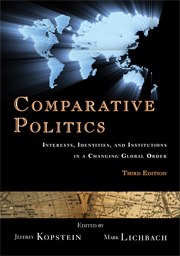Book contents
STOP AND COMPARE
from PART TWO - MIDDLE DEVELOPERS
Summary
EARLY DEVELOPERS AND MIDDLE DEVELOPERS
Once Great Britain and France developed, all other countries were forced to respond. Germany and Japan were among the first to do so. By the middle of the nineteenth century, Germany was not yet unified and Japan faced Western imperialism. German and Japanese variations on the grand strategies of development found in the early developers are the direct result of international competition – military, economic, and cultural – between early and middle developers.
If Great Britain's and France's historical experiences are models of development and revolution from below, Germany and Japan represent instances of development and revolution from above. Compared with their predecessors, the middle and lower classes in Germany and Japan were weaker and the upper classes stronger. The state, in alliance with the upper classes, helped initiate economic development. Above all, what drove the entire process was military competition with more advanced states.
This developmental path had fateful consequences for liberal democracy and ultimately world peace. After abortive attempts at representative democracy, both Germany and Japan thus went through a period of fascism before they could participate in the world economy on an equal basis with the developed West.
MIDDLE DEVELOPERS: GERMANY AND JAPAN
French power on the European continent guaranteed throughout the first 70 years of the nineteenth century that Germany remained a fragmented group of kingdoms and principalities. Among these separate states, however, some were more powerful than others.
- Type
- Chapter
- Information
- Comparative PoliticsInterests, Identities, and Institutions in a Changing Global Order, pp. 211 - 216Publisher: Cambridge University PressPrint publication year: 2008



